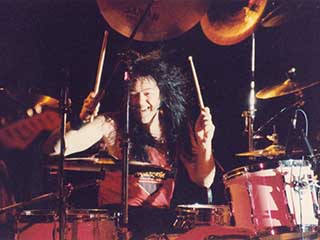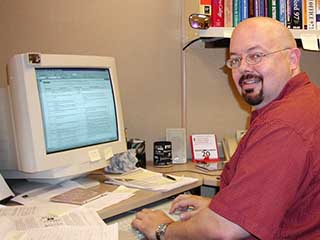

Keith in his natural environment: drumming.
Keith's other life: words.
|
–Geoff-Hart.com: Editing, Writing, and Translation —Home —Services —Books —Articles —Resources —Fiction —Contact me —Français |
You are here: Articles --> 2003 --> Writing to the beat of a different drummer
Vous êtes ici : Essais --> 2003 --> Writing to the beat of a different drummer
By Geoff Hart
Previously published as: Hart, G.J. 2003. Writing to the beat of a different drummer. Intercom September/October:44.
Keith's early career ranged from the sublime (tuxedo-clad and playing triangle for the Springfield Symphony) to the less so (accompanying a Disney World troupe in lederhosen and knee socks). Keith maintained a diplomatic silence about his two tours of duty on "the love boat", but fully embraced his "Animal"* nickname and the "wildman" stereotype attributed to drummers while touring with hard-rock guitarist Pat Travers for 2 years in the late 1980s.
* Legendary drummer for Dr. Teeth and the Electronic Mayhem.
 |
 |
Keith in his natural environment: drumming. |
Keith's other life: words. |
Unfortunately, product endorsements and the respect of his peers didn't keep Keith from working graveyard-shift jobs to make ends meet. "There's no middle class in music—you're either starving or a celebrity." With a young daughter to support, starving wasn't an option, and in 1996, Keith faced the heartbreaking need to abandon his music. Enrolling in computer college (having never touched a PC), he found that stereotypes notwithstanding, a drummer had the brains and drive to master high tech. Keith began his writing career in 1997, documenting mail-order and e-commerce software, and now coordinates a team writing sales proposals for a Florida developer.
But music remains central to Keith's life. Since 1997, he's performed and recorded with Clarence "the Big Man" Clemons, best known as Bruce Springsteen's E Street Band saxophonist. Clarence began assembling his own group, the Temple of Soul, right when Keith decided to quit music and (in George Thorogood's immortal words) "get a haircut and get a real job". Keith briefly resisted the invitation to join the band, but Clemons—a very big man—eventually prevailed. When Springsteen reassembled the E Street Band for their world tour, the Temple of Soul also took off—as did Keith, flying cross-country for TV appearances and concerts between Springsteen gigs.
Keith kept his "real" job, taking vacation time for each performance. Though his company supports their weekend rock star with flexible work hours, touring still consumes most of Keith's free time—but this arrangement at least lets Keith keep playing. As you might expect from a writer, Keith writes his own music, and the 2001 ESPY Awards featured portions of his song Lateshow.
Keith found surprising parallels between drumming and technical writing. Though not all music requires percussion, drumming plays a vital role in many songs—as the heartbeat that gives the music life. Drummers and technical writers both intimately understand being "the invisible guy behind the scenes", with the audience focusing on the stars. The key to satisfaction in both professions lies in accepting the role of team player and doing what you love within that role.
Life on the road often finds Keith spending 23 hours waiting for a 1-hour performance. He fills the downtime by studying (currently for an MBA), with much of the time between shows spent with his face buried in a textbook. So much for the wild life of the gracefully aging rock star!
Keith's career dilemma provided a revelation: life doesn't always force you to abandon what you love just to survive. People can—and should— do more than one thing. Instead of mourning the end of his musical career, Keith learned that "putting yourself in one tiny box—whether as musician, tech writer, or whatever—limits you. I got into tech writing to provide for my daughter. I didn't assume I'd like it, and did assume I'd have to give up music. There's no way that if I were to travel back in time, the Keith of the 80s would ever believe where he'd be in the 21st century." Or that his "real job" would turn out to be so satisfying.
©2004–2024 Geoffrey Hart. All rights reserved.